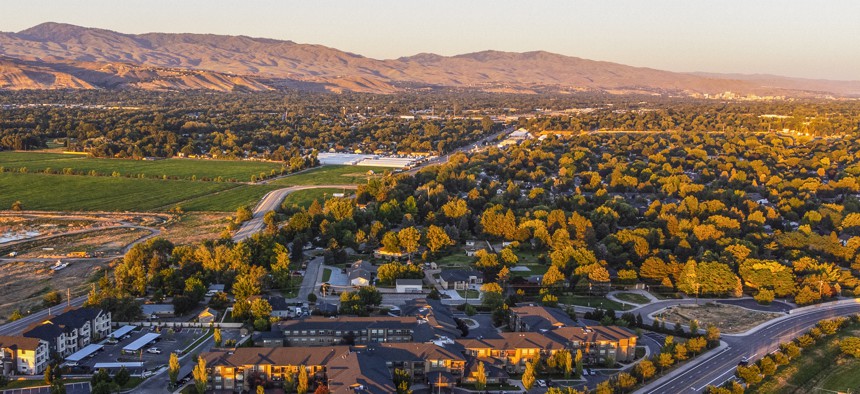15 US Cities Have Housing Markets Overvalued by More Than 50%

Boise, Idaho Getty Images/Shunyu Fan
Four of those markets are overvalued by more than 60%, with Boise, Idaho leading the pack at 73%, according to a recent report.
Fifteen U.S. cities have housing markets overvalued by more than 50%, with four of those markets overvalued by more than 60%, according to the latest study from researchers at Florida Atlantic University and Florida International University.
Boise, Idaho leads the overpriced list because many remote workers moved there during the pandemic, the report says. Boise homes should sell for about $299,000, but buyers are paying $517,000, or 73% above the area’s long-term pricing trend.
In No. 2 Austin, Texas, buyers are paying 68% more for homes, the report says. Consumers in Ogden, Utah (No. 3) are paying 65% more and in Las Vegas (No. 4), 61% more.
“Near-record-low mortgage rates helped fuel demand for housing, especially during the pandemic, and the competition for homes pushed prices higher,” wrote Ken H. Johnson, an economist in FAU’s College of Business, in the report.
But, he added, “Now the Federal Reserve is raising rates to curtail inflation, and already that’s cooling demand.”
Top Overpriced Markets
Here are the cities with homes overvalued by more than 50%:
Boise, Idaho — 72.6%
Austin, Texas — 67.70%
Ogden, Utah — 64.73%
Las Vegas — 61.48%
Atlanta — 58.01%
Phoenix — 57.94%
Provo, Utah — 57.02%
Fort Myers, Florida — 56.26%
Spokane, Washington — 56.25%
Charlotte — 55.25%
Lakeland, Florida — 53.22%
Tampa — 52.41%
Raleigh, North Carolina — 51.70%
Detroit — 51.16%
Each month, Johnson and Eli Beracha, of FIU’s Hollo School of Real Estate, rank the most overvalued housing markets of the 100 largest metropolitan areas by analyzing the premiums buyers are paying. The researchers’ data dates back to 1996 and covers single-family homes, townhomes, condominiums and co-ops.
For more information from the report click here.
Jean Dimeo is managing editor of Route Fifty.
NEXT STORY: Getting ahead of the next pandemic





